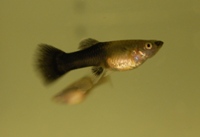Fish follow the leader

Guppy
19 November 2012
Fish shoals follow the first fish to move. And they follow it because it usually knows where to find dinner. Or so say scientists from Aberystwyth University, publishing their investigations of tropical guppies online in the journal Animal Behaviour.
But how, and how much, can fish learn from others?
No surprise perhaps that knowledge leads to boldness (no need to dither if you know where you’re going), but the leaders disregarded the needs of their followers when it came to choosing which café to visit.
Some groups followed a naïve individual who acted boldly and left first, suggesting that some animals may be natural leaders, even without a higher level of knowledge. (An interesting thought following the American election season.)
“The departure of this first fish from the shoal may have been interpreted by other group members as confidence based on knowledge” says Victoria Franks, lead author of the paper, who conducted the research as part of her undergraduate Honours dissertation.
Of course, fish swim in shoals for a number of reasons, including safety from predators. “Fish may start by following the supposed “knowledgeable” leader just because it is acting boldly, but the later fish may just follow the majority – they don’t want to be left behind” says Dr Rupert Marshall, co-author and project supervisor.
Victoria’s research won her the 2011 Science Engineering & Technology (SET) Award for the Best Biology Student in Europe as well as a 1st class Honours degree in Zoology from Aberystwyth University.
“As scientists we try to inspire our students with the wonder of science, provide the training they need to explore that wonder, and support them as they start investigating scientific questions for themselves” says Dr Marshall. “What better example of Aberystwyth’s research-led teaching than publishing undergraduate research in the top peer-reviewed journal in its field. I am delighted at Victoria’s success”.
So do fish just follow a bold leader, or do leaders tell their followers where they’re headed before leaving? In fact, the scientists found that leaders seemed to act selfishly. They appeared to ignore their followers, behaving as if they were unaware of their presence. Although they led them to sites with food rather than without food, they weren’t any more likely to take them to a site with plenty of food than one with barely enough for themselves. So should they always follow the leader?
“Over time, individuals may rely less on information from others and more on their own knowledge as they get to know a particular area. But they’re more likely to rely on social information at first, particularly in new and complex environments” says Dr Marshall.
It’s like driving home at the end of a holiday. ‘I recognise this bit’ you say, switching off the SatNav: ‘I know the way from here’.
Animals which learn by copying are clearly limited in the amount of information that they can learn. “This highlights a selection pressure for more extensive means of transmitting information” concludes Victoria.
Dr Rupert Marshall is Lecturer in Animal Behaviour at Aberystwyth University's Institute for Biological, Environmental & Rural Sciences (IBERS) and a member of the Aquatic, Behavioural & Evolutionary Biology (ABEB). His research centres around animal communication and signal evolution. He coordinates Aberystwyth’s degree scheme in Animal Behaviour (UCAS code C120)
Victoria Franks obtained her BSc (Hons) Zoology at Aberystwyth University in 2011 and has since been pursuing an MSc Wild Animal Biology at the Royal Veterinary College, London. Victoria’s undergraduate Honours dissertation on social learning in guppies won her the 2011 Science Engineering & Technology (SET) Award for the Best Biology Student in Europe.
The Journal of Animal Behaviour is the leading international, peer-reviewed journal in its field. Published by ASAB (Association for the Study of Animal Behaviour) since 1953, it covers all aspects of behavioural biology.



